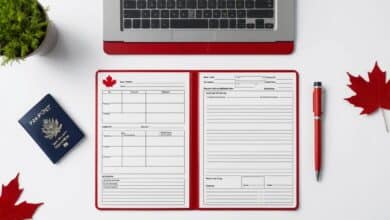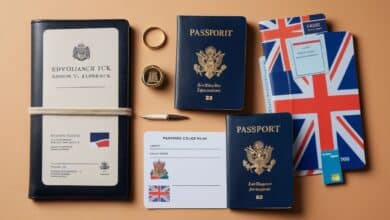Calgary Visa Sponsorship & Marriage Visas: Everything You Should Know
Canadian immigration pathways offer robust solutions for families seeking reunification.
Residents of Alberta’s largest city can leverage specialized programs to bring loved ones into the country through structured legal frameworks. These processes prioritize documentation accuracy and financial preparedness, ensuring applicants meet federal standards.
Eligible sponsors must prove stable income and legal status. The system requires thorough evidence of genuine relationships, particularly for spousal cases. Many find success by working with accredited professionals familiar with Calgary’s unique processing timelines and regional requirements.
Local immigration consultants provide critical support for navigating complex applications. Their expertise helps avoid common pitfalls, from incomplete forms to insufficient proof of commitment. With no annual limits on family-class applications, timely preparation becomes essential for smooth processing.
Successful outcomes often depend on strategic planning aligned with IRCC expectations. Calgary’s multicultural networks offer additional resources for newcomers adapting to Canadian life. Understanding these interconnected elements creates a strong foundation for achieving permanent residency goals.
Marriage Visas & Visa Sponsorship in Calgary
Reuniting with loved ones in Alberta’s largest city requires understanding three primary relationship categories. Each pathway demands specific documentation and evidence to prove commitment. Immigration officials prioritize applications demonstrating authentic partnerships and long-term integration plans.
Relationship Recognition Frameworks
Legally married couples must provide certified marriage certificates recognized by Canadian authorities. Common-law partnerships require proof of continuous cohabitation for 12+ months through utility bills or lease agreements. Conjugal relationships face stricter scrutiny, needing evidence of barriers preventing marriage or cohabitation.
Sponsor Qualifications
Canadian citizens and permanent residents aged 18+ can initiate sponsorship processes. Financial stability proofs include recent tax returns and employment letters. Those residing abroad must submit detailed relocation strategies showing housing arrangements and community connections.
Dependent children under 22 years old can join applications if financially reliant on sponsors. Quebec applicants encounter additional provincial requirements, needing separate processing through Montreal’s immigration offices. Proper preparation reduces delays in these complex procedures.
Eligibility Criteria and Required Documentation
Navigating Canadian immigration processes demands precise adherence to eligibility standards. Sponsors must meet strict legal and financial benchmarks to initiate family reunification cases. Three partnership categories require distinct validation methods to demonstrate relationship authenticity.
Eligibility for Spousal, Common-Law, and Conjugal Partners
Sponsors must confirm their status as Canadian citizens or permanent residents. Those living abroad need concrete plans to re-establish residence in Canada. Unlike other family-class applications, spousal cases don’t enforce minimum income requirements but require proof of basic financial support capabilities.
Essential Documents and Evidence
Applications require certified translations of foreign documents into English or French. Key materials include:
- Government-issued IDs with recent photographs
- Relationship proofs like shared leases or joint bank statements
- Medical exams from approved panel physicians
Police certificates must cover every country where the sponsored person resided for six months after turning 18. Immigration officials prioritize time-stamped communication records and third-party statements confirming authentic relationships. Dependent children need birth certificates and evidence of ongoing financial dependence.
Submitting incomplete forms remains the top reason for processing delays. Many applicants strengthen their cases by including affidavits from community leaders or religious figures familiar with their partnership history.
Step-by-Step Application Process
Submitting a complete application package requires careful attention to IRCC guidelines. This structured approach minimizes errors and accelerates review timelines. Many applicants find success by dividing tasks into preparation and submission phases.
Preparing and Organizing Your Application
Start with the official IMM 5289 guide and country-specific checklists. These resources outline required forms like:
- Sponsorship agreements
- Relationship questionnaires
- Financial support proofs
Organize documents in the order specified by immigration authorities. Certified translations for non-English/French materials must include translator credentials. Time-stamped photos and communication records strengthen relationship evidence.
Submission Procedures and Follow-Up
Use the Permanent Residence Portal for electronic submissions. This system allows fee payments and instant confirmation receipts. “Creating an online account early helps track progress,” notes an immigration advisor.
Sponsored individuals in Canada can request open work permits with their permanent residency applications. Biometric appointments must occur within 30 days of receiving instructions. Regularly check linked accounts for updates or additional document requests.
Understanding Fees and Processing Times
Financial planning forms a critical component of successful immigration processes. Applicants must account for both government fees and hidden costs while preparing their budgets. This section clarifies essential expenses and expected timelines for informed decision-making.
Cost Components and Payment Methods
Standard applications require $1,135 in federal fees. This includes:
- $75 sponsorship evaluation charge
- $475 main applicant processing fee
- $500 permanent resident authorization
Biometric collection adds $85 per person aged 14-79. Families with children pay $150 extra per dependent. Quebec applicants face additional provincial charges of $289.
Schedule Expectations and Deadlines
Most cases receive decisions within 12 months of submission. Complex situations involving multiple dependents or overseas documentation may extend timelines by several months. Delays frequently occur when applicants submit incomplete forms or lack relationship evidence.
Biometric appointments require completion within 30 days of instruction letters. Temporary extensions exist for regions with limited service centers. Smart budgeting should include funds for medical exams, police certificates, and professional translation services.
Investing in thorough preparation reduces processing time and improves outcomes. Many families find immigration consultants’ fees worthwhile for avoiding costly errors and resubmissions.
Common Challenges and Tips for a Successful Application
Applicants often face unexpected hurdles when compiling their immigration paperwork. Three critical areas demand special attention to avoid setbacks and ensure timely processing.
Avoiding Common Document and Evidence Pitfalls
Many delays stem from uncertified translations or expired identification. Relationship proofs require particular care – joint bank statements should show active use, while lease agreements must list both partners. For common-law partners, utility bills need consistent names and addresses over 12 consecutive months.
Strengthening Your Application Package
Create timelines showing financial integration through shared expenses. Include affidavits from community leaders confirming public recognition of the relationship. Spouses should provide:
- Dated photos from multiple events
- Travel itineraries showing visits
- Communication records across different platforms
Practical Advice from Experts
Immigration consultant Adebayo Ogunlesi advises: “Treat your application like a storybook. Each document should advance the narrative of your genuine commitment.” Many successful applicants include future plans like signed apartment leases or employment letters showing relocation preparations.
Couples should cross-reference checklists weekly as requirements change. Electronic submissions allow instant updates if new evidence emerges. Those with complex cases often benefit from professional reviews before finalizing their packages.
Expert Guidance and Comprehensive Support
Professional consultants transform complex immigration procedures into achievable milestones. Regulated Canadian Immigration Consultants bring specialized knowledge to family sponsorship cases, particularly for partners seeking to immigrate Canada. Their expertise covers evolving regulations and regional requirements that challenge independent applicants.
Collaborative Approach with Canadian Immigration Consultants
Accredited professionals begin with detailed case evaluations. They identify potential obstacles in sponsorship process timelines and evidence requirements. Ongoing communication ensures clients understand each phase, from document collection to submission deadlines.
Services extend beyond paperwork management. Consultants help compile strategic evidence like:
- Time-stamped communication records
- Financial co-dependency proofs
- Third-party relationship affidavits
End-to-End Assistance from Preparation to Approval
Comprehensive support begins with eligibility assessments and continues through post-decision phases. Consultants handle direct communications with immigration authorities, reducing response delays. One advisor notes: “Our role includes translating legal jargon into actionable steps for families.”
Specialized knowledge of Calgary’s processing patterns benefits local applicants. Professionals also prepare clients for interviews and potential appeals. This holistic approach builds confidence while maintaining compliance with federal standards.
Final approval often hinges on precise documentation alignment with IRCC expectations. Expert guidance ensures applications meet these benchmarks efficiently, particularly for sponsors residing outside Canada.
Conclusion
Navigating Canada’s family reunification programs demands careful preparation and strategic action. Applicants must balance detailed documentation with clear evidence of authentic relationships. Partnering with accredited professionals often proves vital for meeting strict federal standards.
Financial planning remains crucial beyond initial fees. Sponsors commit to three-year support obligations for their spouse or common-law partner. Open work permits help sponsored individuals contribute economically while awaiting permanent residency decisions.
Calgary’s immigration specialists provide localized insights into processing patterns and evidence requirements. Their guidance strengthens applications for conjugal partners and other complex cases. Thorough preparation with expert support typically yields faster outcomes than independent submissions.
Successful reunification hinges on understanding evolving policies and maintaining organized records. Those investing time in proper documentation and professional collaboration position themselves for smooth transitions into Canadian life.
For more information, explore the official visa website mentioned in this article:
You will be redirected to another website
FAQ
What types of visas are available for spousal or partner sponsorship in Calgary?
Options include sponsorship for spouses, common-law partners, and conjugal partners. Applications can be processed through inland (within Canada) or outland (outside Canada) pathways, with eligibility depending on the relationship’s authenticity and legal status.
Can permanent residents sponsor a spouse or partner?
Yes, permanent residents may sponsor eligible partners if they meet income requirements, reside in Canada, and commit to financially supporting the sponsored person for a specified period. Certain criminal or immigration violations may disqualify sponsors.
How long does the sponsorship process typically take?
Processing times vary based on application type, completeness, and the applicant’s country of origin. Most applications take 12–24 months. Delays may occur if additional documents or biometrics are requested.
What evidence strengthens a sponsorship application?
Proof of genuine relationships—such as joint financial records, photos, communication logs, and affidavits—is critical. For common-law partners, cohabitation evidence like leases or utility bills is required. Missing or inconsistent documentation often leads to delays or refusals.
Are open work permits available during the application process?
Inland applicants may qualify for an open work permit while awaiting approval. This allows sponsored partners to work in Canada temporarily, provided eligibility criteria are met and the application is submitted correctly.
What financial obligations do sponsors have?
Sponsors must demonstrate sufficient income to support the sponsored person and any dependents. This includes meeting minimum necessary income (MNI) thresholds for specific family sizes, excluding Quebec applicants, who follow provincial guidelines.
Can a sponsorship application be refused due to past immigration issues?
Yes. Applications may face refusal if the sponsor or applicant has unresolved criminal charges, misrepresented information, or violated immigration laws. Consulting an immigration consultant can help address these challenges proactively.
How do biometrics affect processing timelines?
Biometrics (fingerprints and photos) are mandatory for most applicants and must be submitted within 30 days of request. Delays in providing biometrics pause processing, extending overall timelines.
What role do immigration consultants play in the process?
Consultants provide end-to-end support, from verifying eligibility and organizing documents to liaising with Immigration, Refugees and Citizenship Canada (IRCC). Their expertise reduces errors, improves application quality, and addresses complex cases like conjugal partnerships.
Published on: 19 de August de 2025

Bakari Romano
Bakari Romano is a finance and investment expert with a strong background in administration. As a dedicated professional, Bakari is passionate about sharing his knowledge to empower individuals in managing their finances effectively. Driven by this mission, he founded FinancasPro.com, where he provides insightful and practical advice to help people make informed financial decisions. Through his work on the site, Bakari continues to make finance accessible and understandable, bridging the gap between expert knowledge and everyday financial needs.






